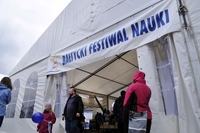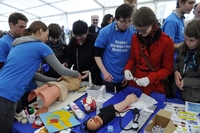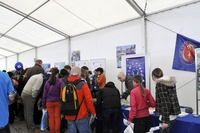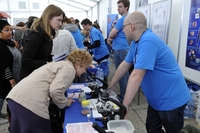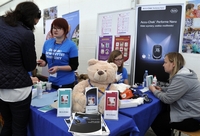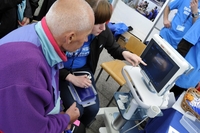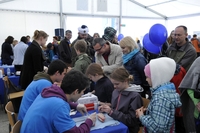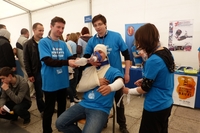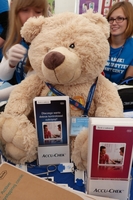A Sunday full of attractions
29.05.2013
Saving human lives became an unwritten tradition of MUG’s participation in the Science Picnic in Gdynia. In the past years we have dressed the visitors’ various wounds and this year the students from the Student Scientific Club at the MUG Department of Emergency Medicine rushed to help a visitor who fainted. However that was not the end of our involvement in the concluding event of the Baltic Science Festival which took place on Sunday May 26th 2013 at 10:00-18:00 at the Kościuszko Square in Gdynia. The Student Scientific Club at the MUG Department of Oncologic Surgery organized the highly popular surgical suturing course and taught breast self-examination on special mannequins. Nearly 300 visitors had their blood pressure and glucose levels tested by the students. The students of the Student Scientific Club at the MUG Department of Anesthesiology and Intensive Care were present for the first time at the Picnic and attracted large crowds of visitors. They used ultrasound to show the blood vessels of the arm, taught how to insert an intravenous cannula and deliver oxygen using a bag valve mask. The veterans of the Sunday event, Emergency Medicine students, spent the whole day teaching life saving skills on special mannequins, first aid, and thanks to the idea of dr Ewa Raniszewska – wound dressing skills. In the name of science, one student promoted the MUG while having a completely bandaged head and an arm wrapped in a MUG bandana. The students and staff of the MUG Department of Biology and Pharmaceutical Botany prepared an art corner for children. The frequently abstract drawings by the little artists were displayed all day long on a designated board and each artist received a pleasant-smelling or tasty gifts. Besides the smell recognition contest there was a chance to taste medicinal herb mixes and fruit teas which kept the visitors warm during this rather chilly Sunday afternoon.
The visitors reacted most strongly to the second booth prepared by this Department: a showcase of the most common parasites that infect humans. Everyone could see exactly how does an unarmed tapeworm, tick or the giant roundworm looks like. Many asked about how to properly remove a tick, what percent of people have roundworms and why we should not eat berries directly from the bush.
“I answered all of the above questions and offered advice on how to prevent a parasitic infection, e.g. wash your hands before every meal, wash all fruit and vegetables, do not eat meat from an uncertain source, deworm puppies etc.” explained dr Adam Bogdan from the MUG Department of Biology and Pharmaceutical Botany. “In order not to cause too much fear, we offered the children some sweet surprises: hand-made jellies shaped like liver flukes, giant roundworms and tapeworms.
Among the visitors of the Sunday’s Science Picnic were representatives of our University. Prof. Marcin Gruchała (Vice-Rector for Student Affairs), prof. Jacek Bigda (head of the Rector’s Bureau for Strategy and International Cooperation) and mgr Ewa Kiszka (head of the Department of International Cooperation, Promotion and Developmental Projects) have visited all the MUG booths and displays. For the Vice-Rector for Student Affairs, chatting with students was a bit of a sentimental journey to his own student days. “It was very nice to see how popular were our booths among the visitors. It is particularly impressive how active are the students of our University, involved in Scientific Clubs, offering displays and workshops at the booths. I congratulate all the students and staff for organizing such an excellent picnic!”
More pictures can be found in the gallery at Gallery > XI Bałtycki Festiwal Nauki 2013
Archives
- Academic Year 2024/2025
- Academic Year 2023/2024
- Academic Year 2022/2023
- Academic Year 2021/2022
- Academic Year 2020/2021
- Academic Year 2019/2020
- Academic Year 2018/2019
- Academic Year 2017/2018
- Academic Year 2016/2017
- Academic Year 2015/2016
- Academic Year 2014/2015
- Academic Year 2013/2014
- Academic Year 2012/2013
